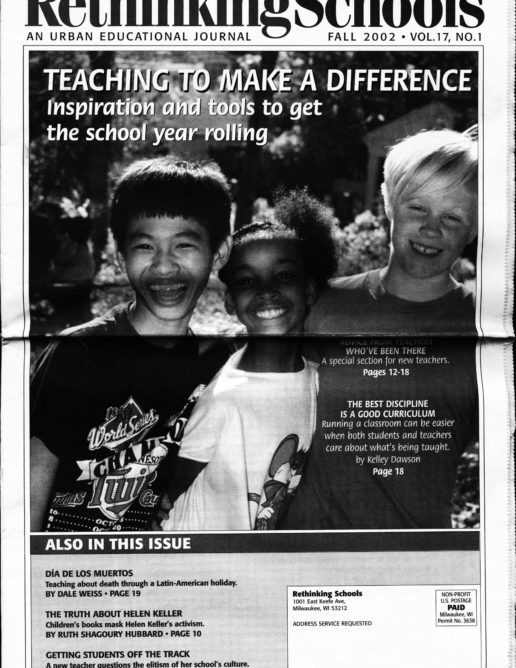The Fordham Foundation
The anniversary of Sept. 11 found the nation and our schools still wrestling uneasily with the aftermath of that horrible day.
It also found the Bush Administration beating the drums of war, trying to rally popular opinion behind a “preemptive” attack on Iraq. And it found members of the administration’s extended family trying to push their nationalistic vision into the schools.
The Thomas B. Fordham Foundation, a conservative research group populated with former officials of the Reagan and Bush Administrations and headed by Reagan’s former assistant education secretary Chester Finn, marked the anniversary by releasing a collection of essays, titled “September 11: What Our Children Need to Know.” The Foundation’s report was a prime source for media stories about how the National Education Association (NEA) and others – including Rethinking Schools – were promoting a “blame America” curriculum response to the Sept. 11 anniversary.
Readers who want to read what Rethinking Schools published in response to Sept. 11 should go to /special_reports/sept11/. They’ll find, among others, an article by Alfie Kohn that Finn singled out in the Fordham report for being critical of U.S. foreign policy and not patriotic enough.
For Fordham, it seems that patriotism and critical thinking are incompatible. They attack Kohn and Rethinking Schools because we urge students to try to understand the global roots of terrorism rather than simply labeling it “evil.” Finn waves the patriotic flag, but really what he wants is for teachers to stop engaging students in critical thinking, in asking deep questions about U.S. conduct in the world. Finn insists that such inquiry promotes the notion that “America … has itself to blame for the other guys’ aggression inflicted upon us.” Apparently he can’t entertain the possibility that there may be a distinction between explaining terrorism and excusing it.
The Fordham approach is profoundly anti-intellectual. For Fordham, the Sept. 11 attacks can be explained by “the presence of evil.” And evil, like the devil, needs no explanation. In this self-serving, unscholarly approach, “we” get to be the good guys, because, of course, evil only attacks good. This is Popeye versus Bluto, not scholarship – and it certainly does not help our students think clearly about today’s world.
The ideological blame game that Finn’s foundation promotes has its own ugly political agenda. It seeks to attack teacher unions, ridicule sensitivity to issues of diversity, discrimination, or civil rights, and to intimidate teachers who dare to ask students to reflect critically on any aspect of American life.
Many of the lessons from Sept. 11 will not be learned in classrooms. Families, communities, parents, and friends each provide their own ways of understanding and responding to Sept. 11 and its aftermath. And while there are many Americans who sincerely believe that the United States has been a universal force for good in global affairs, a defender of freedom and human dignity, and a champion of the democratic rights of the poor, unfortunately, the historical truth is different. Facing that truth squarely is essential to understanding our past and our present, and to any hopes we have as a nation that our post-Sept. 11 future will be filled with democracy, peace, and justice.

